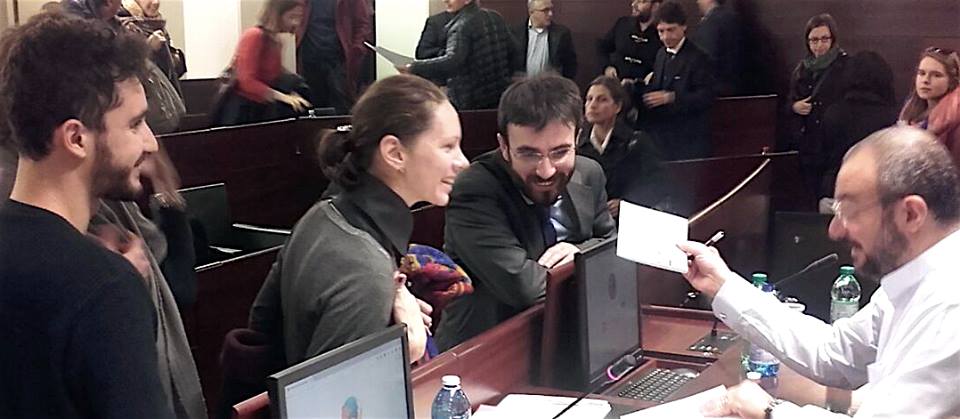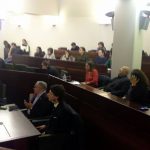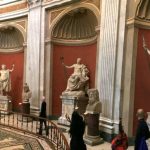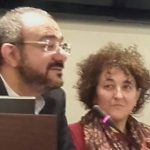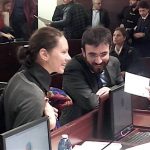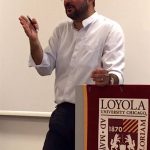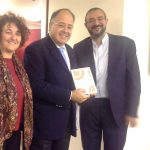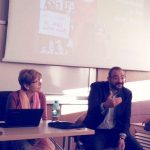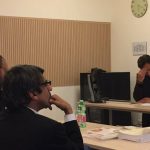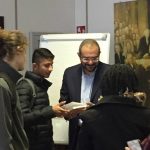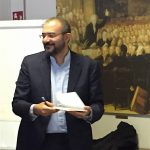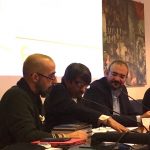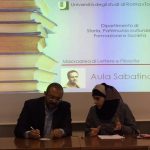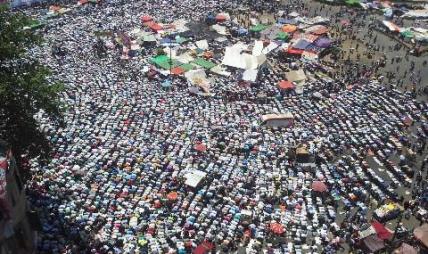In the same day, I visited the Vatican City and gave a lecture at the Rome campus of Loyola University Chicago – an American Jesuit Catholic University. I have to say that I found a stark contrast between the Jesuit values and what I saw at the Vatican! A Jesuit gives a “vow for poverty and chastity” and works for a mission of the “promotion of justice”. I found the Vatican, on the other hand, at the opposite of these values, with a “palace” that has 1400 rooms and 9 full miles of corridors that are full of pagan statues, gold, diamonds, let alone Michelangelo’s depictions of every “divine” concept and persona in the most non-divine ways, to say the least. Tawasul Center for Research and Dialogue Italy organized the lecture to discuss the topic of “rule of law from an Islamic point of view” with Loyola’s professors and students. I mentioned that the “rule of law” is certainly an Islamic value, but it is meaningless if the “law” itself is used as a tool for establishing injustice and corruption, as we see in today’s world everywhere.
Today Italy is crucial for the Muslim-European-Western inter-civilizational dialogue and for cooperation on various causes of justice. This is not because of the Vatican, in my opinion, but rather because of the openness of the Italian intelligentsia to Islam and Islamic thought. Sapienza Università di Roma is the oldest (since 1303), largest (125 thousand students) and one of Europe’s top universities. There, I was delighted to launch and sign my latest book in the Italian language: Lectures on the Civil State: Towards Post-Islamism and Post-Secularism, translated by Dr. Sabrina Lei and published by Tawasul Centre for Research and Dialogue Italy. With a kind introduction of the university’s Rector Prof. Eugenio Gaudio and the moderation of Prof. Alessandra Mignolli, my lecture’s main point was the importance of a theology of revolution, where supporters of justice in social justice movements everywhere, could cooperate to bring down contemporary tyranny. This could be done by pushing the top 1% towards the bottom 90%, not only politically, but also economically and in religious authority and institutions. I argued that both Islamism and secularism, in their traditional forms, allowed for contemporary tyranny to grow rather than retreat, and I was happy to see the interest of a number of excellent Italian professors and graduate students in what Islam can contribute for today’s humanity and the quest of justice everywhere
Muslims in Europe in general, and specifically in Italy, are mainly speaking to themselves and are falling short in addressing the wider society. And when we talk to the wider society, it is always about our narrow “Islamic” political or cultural concerns, rather than other “Islamic” issues of social justice, public good, and what it means to have true faith in God. My last day in Rome was between the University of Rome Tor Vergata and LUISS Guido Carli (Libera Università Internazionale degli Studi Sociali). I was pleasantly surprised with how similar my views were, on social justice and the role of religion in society, with some of the highly intellectual and influential Italian academics; the kind of academics who are genuinely concerned about society and its vibrancy, and warmly welcome a role of religion to build bridges and support justice, beyond the “secular” taboos and silly phobia from others. The Islamic thought cannot afford to be a philosophical exercise, but should rather be a way through which Muslims should collaborate with brothers and sisters in humanity. We need a new “hilf al-fudoul” (the alliance of the virtue), like the wide and multi-faith alliance that Prophet (s) had in Mecca.


